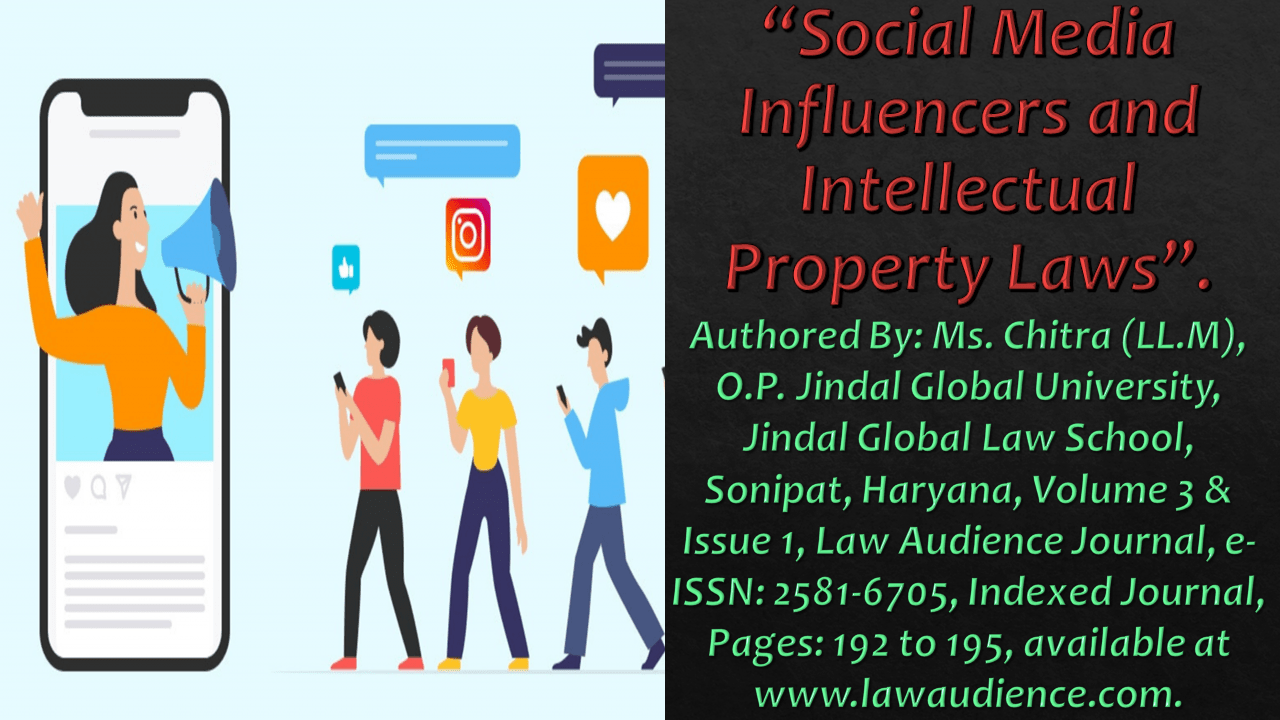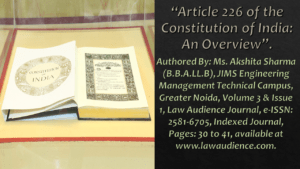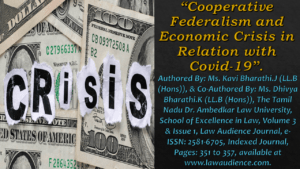Click here to download the full paper (PDF)
Authored By: Ms. Chitra (LL.M), O.P. Jindal Global University, Jindal Global Law School, Sonipat, Haryana,
Click here for Copyright Policy.
ABSTRACT:
“Social media has brought the world so close; nobody can imagine their life without the existence of the online platforms. But the social media is actually a boon or bane. The content provided by social media is exposed to the masses and if it had not been about the awareness of Intellectual Property Laws, the content posted was at the risk of getting exploited by many. But social media influencers have the right to not only register but also enforce their intellectual property rights with respect to copyright and trademark laws”.
I. INTRODUCTION:
The Internet seems like a whole new world, a shining and shimmering place than it was a few years ago. With the exponential growth of technology, we have seen certain changes that revolutionized the digital platforms, social media influencers to name one. Who are social media influencers has a very simple answer to it that they are people who can wield a great deal of influence over the masses using their online sphere such as YouTube, Instagram, Facebook, Twitter, Pinterest amongst many others. Now the question is what is the relation between influencers and Intellectual property laws? Since the social media influencers can reach millions of people, their content becomes more exploitable to certain legal risks. Intellectual property comprises of the subject matter, unique name, content, domain name and even the hashtags that are used by the influencers.
Bombay High Court delivered some interesting insights on social media influencers in the judgment of Marico Limited vs. Abhijeet Bhansali[1], where the court held that with great power comes the great responsibility. The duties and obligations of the social media influencers were addressed by learned Justice S. J. Kathawalla describing that since the influences have the capability of inspiring people with their content, they can also change the mindset of public in a positive or scarily in a negative way too. Thus, a sense of responsibility must be always ensured by the influencers regarding the subject matter of the content they are uploading on online platforms.
II. HOW CAN SOCIAL MEDIA INFLUENCERS PROTECT THEMSELVES?
II.I Copyrighted Content:
Copyright provides protection to the original works of authorship that ranges from books, music, paintings, sculpture, films, advertisement and other original creations. The content including photographs, videos, written text, art, sound recordings, cinematograph film shall be governed under ambit of copyright. Social media influencers must have prior permission before indulging in use of other creator’s work or otherwise qualify for copyright exemption such as fair use while posting. There are several aspects that could be taken into account while looking at copyright infringement such as the commercial and non-commercial factor, use of the substantial part, communication to public etc. Fair use is only available for limited exceptions, and in the case of influencers it is tricky to prove.
II.II Trademarks:
Trademarks comprises of a recognizable sign, design, insignia, phrase or word that denotes a specific product and legally differentiates it. Generally, the influencers should obtain prior permission from the brand whose name or logo they will be using in their online content. Posting content that contains another person’s trademark, brand name, or logo may violate their exclusive intellectual property rights.
In the Marico Case, it was said that there is unauthorized use of registered trademarks in a manner, which is detrimental to its distinctive character or reputation, cannot be in accordance with the honest practices in industrial or commercial matters. Often, domain names are also registered as trademarks if they fulfill all the conditions required for registering a trademark.
III. PROTECTION OF CONTENT ON SOCIAL MEDIA:
Social media platforms such as Facebook, Twitter or Pinterest allow posting of content that might be copyrighted. The social media site does not own the work that is being uploaded on the respective website or application, the copyright still exists with the user only. When you enter any social platform, need to create an account and as a part of the creation of portal exists an agreement that allows the respective website or application a license to use the work for a variety of purposes such as displaying it or copying it. In these cases, the license is given free of cost, there is no monetary transaction.
The Twitter terms of service state, “Content is the sole responsibility of the person who originated the Content,” but they reserve the right to remove Content that violates the User Agreement. Twitter says that if you believe your Content has been copied in a way that “constitutes copyright infringement” you can file a report at the website itself. Terms and services of Pinterest give users a “limited non-exclusive, non-transferable, and revocable license” to use their services. The Facebook terms and services state that account holder owns the intellectual property rights (including copyright or trademark) regarding the content that is being created, uploaded and shared on Facebook and other Facebook products such as Instagram, but also mentions that “you grant us a non-exclusive, transferable, sub-licensable, royalty-free, worldwide license to host, use, distribute, modify, run, copy, publicly perform or display, translate works of your content” under the agreement.[2]
IV. CONCLUSION:
Social Media Influencers can not only register but also enforce their intellectual property rights. Online aliases, logos, brand names, slogans, marks, series names, and hashtags are considered under the category of protection under trademarks. Artistic works such as images, videos, photographs, written text, artwork, sound recordings, films, and other creative works are can be copyrighted. Furthermore, third-party use of an influencer’s name, image, or likeness shall be shielded as a right of publicity. Social media influencers have even taken stance to trademark their own name. Lele Pons, a famous YouTuber, has a trademark application under Class 41 (entertainment services) at the USPTO (the United States Patent and Trademark Office), similarly, Kylie Jenner has trademark registration under Class 35 for “Advertising services, namely promoting the brands, goods, and services of others; endorsement services, namely promoting the goods and services of others.”[3]
There has been a surprising change in our lives with the evolution of social media, which cannot be turned back in time. Access to the online platforms is provided to the remote areas of the world, hence the world started looking so small. The concept of intellectual property is vast in itself and online sharing has made it even more complex, but if addressed with caution, protection of intellectual property rights can be efficient.
Footnotes:
[1] Notice of Motion No 1094 of 2019 in COMIP No. 596 of 2019.
[2] How copyright works with social media https://www.thebalancesmb.com/.
[3] Social media influencers and IPR https://www.kashishworld.com/blog/social-media-influencers-and-intellectual-property-rights/.
References:
- Marico Limited v Abhijeet Bhansali (Notice of Motion No 1094 of 2019 in COMIP No. 596 of 2019), https://www.lexology.com/library/detail.aspx?g=b97116be-e487-47c1-9e33-7d6d89c309e1.
- Social Media Influencers and Intellectual Property Rights, https://www.kashishworld.com/blog/social-media-influencers-and-intellectual-property-rights/.
- How copyright works with social media, https://www.thebalancesmb.com/copyrights-and-social-media-issues-397821.
Cite this article as:
Ms. Chitra, Social Media Influencers and Intellectual Property Laws, Vol.3 & Issue 1, Law Audience Journal, Pages 192 to 195 (23rd June 2021), available at https://www.lawaudience.com/social-media-influencers-and-intellectual-property-laws/.



